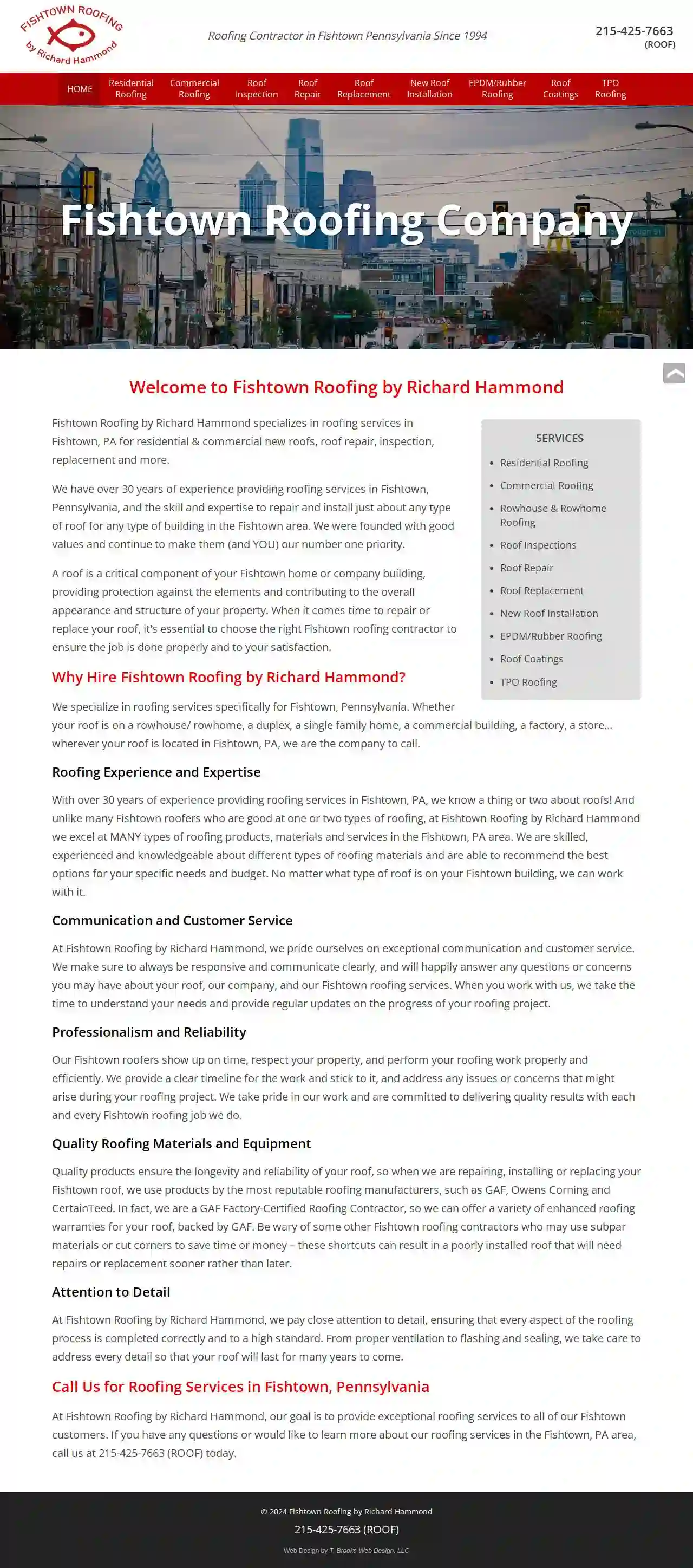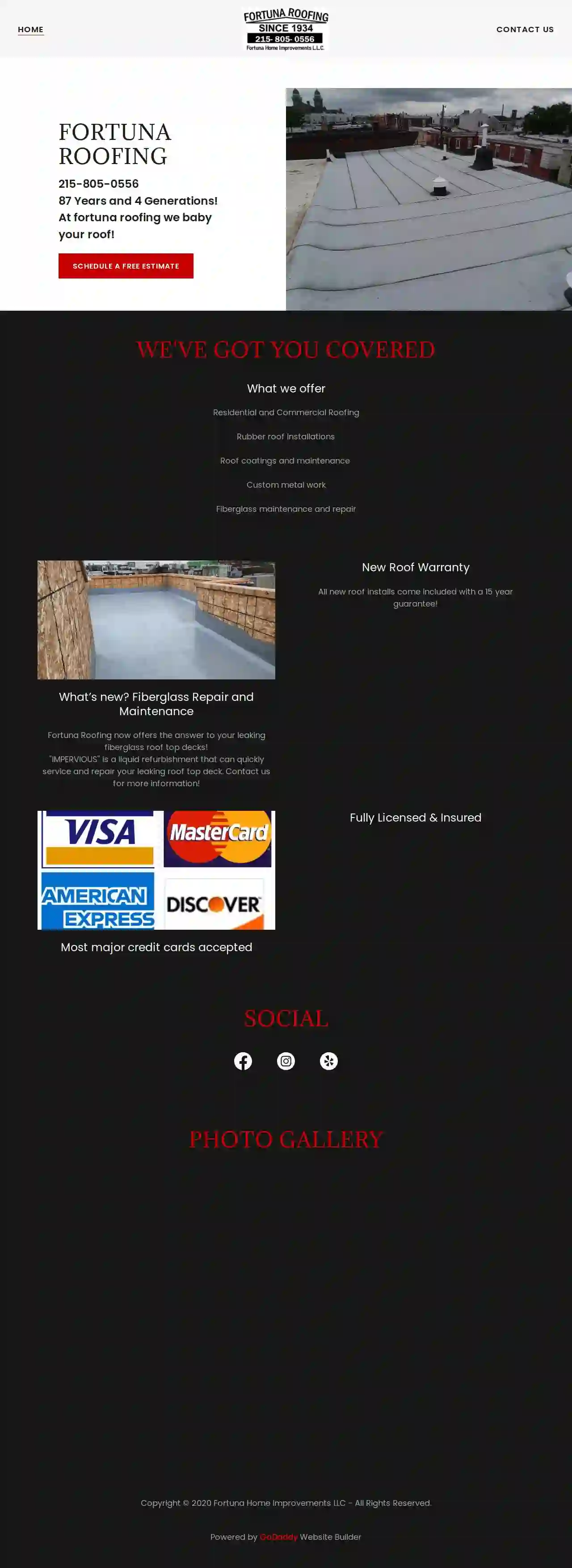Roofing Companies Jenkins
Find Roofing Companies in Jenkins
Get multiple Roofing Service quotes for your project today! Compare profiles, reviews, accreditations, portfolio, etc... and choose the best deal.

Fishtown Roofing by Richard Hammond
51 reviewsFishtown, USRoofing Contractor in Fishtown Pennsylvania Since 1994. We have over 30 years of experience providing roofing services in Fishtown, Pennsylvania, and the skill and expertise to repair and install just about any type of roof for any type of building in the Fishtown area. We were founded with good values and continue to make them (and YOU) our number one priority. A roof is a critical component of your Fishtown home or company building, providing protection against the elements and contributing to the overall appearance and structure of your property. When it comes time to repair or replace your roof, it's essential to choose the right Fishtown roofing contractor to ensure the job is done properly and to your satisfaction. We specialize in roofing services specifically for Fishtown, Pennsylvania. Whether your roof is on a rowhouse/ rowhome, a duplex, a single family home, a commercial building, a factory, a store... wherever your roof is located in Fishtown, PA, we are the company to call. With over 30 years of experience providing roofing services in Fishtown, PA, we know a thing or two about roofs! And unlike many Fishtown roofers who are good at one or two types of roofing, at Fishtown Roofing by Richard Hammond we excel at MANY types of roofing products, materials and services in the Fishtown, PA area. We are skilled, experienced and knowledgeable about different types of roofing materials and are able to recommend the best options for your specific needs and budget. No matter what type of roof is on your Fishtown building, we can work with it. At Fishtown Roofing by Richard Hammond, we pride ourselves on exceptional communication and customer service. We make sure to always be responsive and communicate clearly, and will happily answer any questions or concerns you may have about your roof, our company, and our Fishtown roofing services. When you work with us, we take the time to understand your needs and provide regular updates on the progress of your roofing project. Our Fishtown roofers show up on time, respect your property, and perform your roofing work properly and efficiently. We provide a clear timeline for the work and stick to it, and address any issues or concerns that might arise during your roofing project. We take pride in our work and are committed to delivering quality results with each and every Fishtown roofing job we do. Quality products ensure the longevity and reliability of your roof, so when we are repairing, installing or replacing your Fishtown roof, we use products by the most reputable roofing manufacturers, such as GAF, Owens Corning and CertainTeed. In fact, we are a GAF Factory-Certified Roofing Contractor, so we can offer a variety of enhanced roofing warranties for your roof, backed by GAF. Be wary of some other Fishtown roofing contractors who may use subpar materials or cut corners to save time or money – these shortcuts can result in a poorly installed roof that will need repairs or replacement sooner rather than later. At Fishtown Roofing by Richard Hammond, we pay close attention to detail, ensuring that every aspect of the roofing process is completed correctly and to a high standard. From proper ventilation to flashing and sealing, we take care to address every detail so that your roof will last for many years to come.
- Services
- Why Us?
- Accreditations
- Our Team
- Gallery
Get Quote
RKS Roofing Contractors
573 reviews19 Portisham Place, Strensall, YO32 5AZ, USEstablished in 1999, RKS Roofing Contractors has over 15 years of experience in the roofing industry. We carry out all types of pitch roofing and flat roof works in traditional and new methods in and around York. We carry out small repairs to full re-roofs, and we also specialise in heritage renovation work and working on historic buildings. Our family-run firm prides itself on an excellent reputation for quality, service, safety and reliability. The company employs a skilled team of qualified roofing specialists and craft operatives, who have wide knowledge in both traditional and up to date roofing skills. If you are looking for a good roofer in York or a good roofing contractor in the York area please give us a call - we will be happy to provide free quotes on roofing repairs. Finding a recommended roofer or roofing contractors can be difficult, but we are extremely proud of our work and the standards we achieve, with customer satisfaction as our main objective. With the best reputation in the local area for our roofing services, we can assure you are in safe hands and can expect a high level of professionalism and superb workmanship. Our roofing company offers a guarantee of all work carried out. Our roofing expertise and experience are second-to-none, and there is no job too big, or too small for our dedicated team.
- Services
- Why Us?
- Testimonials
- Gallery
Get Quote
Always Perfect Contracting
4.972 reviews833 Becks Run Rd, Pittsburgh, Pittsburgh, PA, USElevate Your Home's Protection and Aesthetic with Premier Roofing Services in Pittsburgh, PA. Roofing is not just about making a house look good; it is fundamentally about protecting your home and loved ones from the elements. Always Perfect Contracting Inc., understands this better than anyone. With our exceptional roofing services, we help homeowners in Pittsburgh, PA, enhance the durability, value, and beauty of their homes. Our expertise spans across roof replacement services, roof repair services, gutter installations, siding, box gutter conversion, design and remodeling, and DaVinci roofing, ensuring a solution tailored to your specific needs. As a proud Directorii contractor, we offer an added layer of confidence with every job. Directorii backs all engagements through their system with a robust $20K guarantee, ensuring your investment is protected.
- Services
- Why Us?
- Gallery
Get Quote
Lifetime Quality Roofing Pittsburgh
4.9186 reviewsPittsburgh, PA, 159 Perry Hwy Suite 102, 15229, USAt Lifetime Quality Roofing, we pride ourselves on being the most trustworthy roofing company in Pittsburgh for all your repair and replacement needs. We know the local Pittsburgh roofing market and its unique weather challenges inside and out. Check out what our happy Pittsburgh customers have to say about our work. From our decades of experience to thousands of successful projects, it’s clear why Pittsburgh homeowners consistently choose Lifetime Quality Roofing. Our deep expertise, excellent craftsmanship, and stellar customer service set us apart.
- Services
- Why Us?
- Accreditations
- Our Team
- Testimonials
- Gallery
Get Quote
Colonial Roofing Service
510 reviews1 East Broward Blvd Suit 700, Fort Lauderdale, 33301, USFor over two decades, Colonial Roofing has been committed to delivering superior shingle and metal roofing solutions to the locals of Broward County and the Beaches areas in Florida. Our extensive experience has equipped us with the expertise to replace and repair roofs of different shapes and sizes. We take a unique approach to roofing by utilizing high-quality and reliable materials, coupled with innovative installation techniques to create shingle or metal roofs that are not only visually appealing but also resilient enough to withstand the harsh weather patterns in Jacksonville. Learn More.
- Services
- Why Us?
- Gallery
Get Quote
Philly's Phinest Roofing
4.4234 reviews2729 Berkshire St., Philadelphia, 19137, USFor four decades, Philly’s Phinest Roofing has been a trusted name in Philadelphia and the Tri-State Area. We specialize in affordable, top-notch roofing services such as repair, leak detection, installation, maintenance, and 24/7 emergency assistance. We're committed to ensuring the durability of your roof. Contact us today for a complimentary estimate from Philadelphia’s premier roofing experts! We offer free estimates for all services and are dedicated to providing our neighbors with excellent service they can rely on. You can read our testimonials to see what our customers are saying about working with Philly’s Phinest Roofing. Installing and maintaining a roof in the Philadelphia area can be a challenge. Humid summers, high winds, heavy rains, and even the occasional snowstorm can wreak havoc on your roof. Our team at Philly’s Phinest Roofing is here to give you the best quality roof available. We do our gutter and roof repairs with the finest professional materials. All of our work is 100% guaranteed.
- Services
- Why Us?
- Our Team
- Testimonials
- Gallery
Get Quote
Thomas James Roofing and Waterproofing
4.936 reviewsRego Park, Rego Park, NY, USThomas James Roofing and Waterproofing is a local, family-owned company that has been caring for its neighbors' homes and businesses for over 40 years. With a team of experienced and attentive professionals, we provide dependable, customized solutions for all your roofing, gutter, and waterproofing needs. Our commitment to customer satisfaction is evident in our 'A+' rating from the Better Business Bureau and our four-time Angie's Super Service Award winner. We are proud to call Rego Park our home and happy to provide services throughout the five boroughs of New York City. Our customers are our neighbors and friends, which is why we treat every project as if it were our own.
- Services
- Why Us?
- Accreditations
- Gallery
Get Quote
Permanent Roofing Specialists
44 reviewsErie, USPermanent Roofing Specialists is a premier roofing contractor serving the state of Iowa. We offer a wide range of roofing products and services to address all your roofing needs, from reroofing and repair to new construction and asbestos removal. We are committed to providing exceptional service and quality workmanship, using premium materials that are built to last. Our team of experienced and knowledgeable specialists can handle both residential and commercial projects, big or small. We stand behind our work with a 100% satisfaction guarantee and offer free estimates. Investing in the right roofing system can save you money in the long run by preventing costly repairs. Contact us today to learn more about how we can help you get the best roof in town!
- Services
- Why Us?
- Accreditations
- Gallery
Get Quote
Red Maison Construction, LLC
4.29 reviewsPhiladelphia, US- Services
- Why Us?
- Gallery
Get Quote
Fortuna Roofing
4.331 reviewsPhiladelphia, USFORTUNA ROOFING 87 Years and 4 Generations! At fortuna roofing we baby your roof! Schedule a FREE estimate We've Got You Covered What we offer Residential and Commercial Roofing Rubber roof installations Roof coatings and maintenance Custom metal work Fiberglass maintenance and repair What’s new? Fiberglass Repair and Maintenance Fortuna Roofing now offers the answer to your leaking fiberglass roof top decks! "IMPERVIOUS" is a liquid refurbishment that can quickly service and repair your leaking roof top deck. Contact us for more information! New Roof Warranty All new roof installs come included with a 15 year guarantee! Most major credit cards accepted Fully Licensed & Insured Social Photo Gallery
- Services
- Why Us?
- Gallery
Get Quote
Over 17,196+ Roofing Contractors in our network
Our roofing contractors operate in Jenkins & surroundings!
Roofyng.com has curated and vetted the Best Roofers near Jenkins. Find the most reliable business today.
Frequently Asked Questions About Roofing Companies
- Asphalt Shingles: 20-30 years
- Metal Roofing: 40-70 years
- Tile Roofing: 50-100 years or more (clay and slate)
- Flat Roofing: 15-30 years (depending on material)
- Slate: 100 years or more
- Wood Shakes or Shingles: 30-50 years (with proper maintenance)
- Leaks or Water Stains: Water stains on ceilings or walls, dripping water, or dampness in the attic.
- Missing, Cracked, or Curled Shingles: Inspect for damaged or missing shingles, especially after a storm.
- Damaged Flashing: Look for rust, corrosion, or gaps in flashing around chimneys, vents, or skylights.
- Sagging or Uneven Rooflines: A sagging roof could indicate structural problems.
- Granule Loss: Excessive granules in gutters suggest aging asphalt shingles.
- Moss or Algae Growth: Can trap moisture and damage roofing materials.
- Safety First: Avoid going onto the roof during a storm, as it's dangerous.
- Document the Damage: Take photos and videos of the damage for insurance purposes.
- Contact Your Insurance Company: Report the damage to your insurance company as soon as possible to initiate a claim.
- Temporary Repairs: If safe, address any immediate leaks using buckets or tarps to minimize further damage.
- Contact a Roofing Contractor: After the storm, have a qualified roofing contractor inspect the roof and provide a repair estimate.
- Ventilation: Soffit vents provide intake ventilation, allowing fresh air to enter the attic and regulate temperature and moisture.
- Aesthetics: It creates a finished look to the roof's underside.
- Pest Control: A properly sealed soffit prevents pests like birds and squirrels from nesting in the attic.
How long does a roof typically last?
What are some common signs of roof damage?
What should I do if my roof is damaged in a storm?
What is a soffit, and why is it important for my roof?
How long does a roof typically last?
- Asphalt Shingles: 20-30 years
- Metal Roofing: 40-70 years
- Tile Roofing: 50-100 years or more (clay and slate)
- Flat Roofing: 15-30 years (depending on material)
- Slate: 100 years or more
- Wood Shakes or Shingles: 30-50 years (with proper maintenance)
What are some common signs of roof damage?
- Leaks or Water Stains: Water stains on ceilings or walls, dripping water, or dampness in the attic.
- Missing, Cracked, or Curled Shingles: Inspect for damaged or missing shingles, especially after a storm.
- Damaged Flashing: Look for rust, corrosion, or gaps in flashing around chimneys, vents, or skylights.
- Sagging or Uneven Rooflines: A sagging roof could indicate structural problems.
- Granule Loss: Excessive granules in gutters suggest aging asphalt shingles.
- Moss or Algae Growth: Can trap moisture and damage roofing materials.
What should I do if my roof is damaged in a storm?
- Safety First: Avoid going onto the roof during a storm, as it's dangerous.
- Document the Damage: Take photos and videos of the damage for insurance purposes.
- Contact Your Insurance Company: Report the damage to your insurance company as soon as possible to initiate a claim.
- Temporary Repairs: If safe, address any immediate leaks using buckets or tarps to minimize further damage.
- Contact a Roofing Contractor: After the storm, have a qualified roofing contractor inspect the roof and provide a repair estimate.
What is a soffit, and why is it important for my roof?
- Ventilation: Soffit vents provide intake ventilation, allowing fresh air to enter the attic and regulate temperature and moisture.
- Aesthetics: It creates a finished look to the roof's underside.
- Pest Control: A properly sealed soffit prevents pests like birds and squirrels from nesting in the attic.